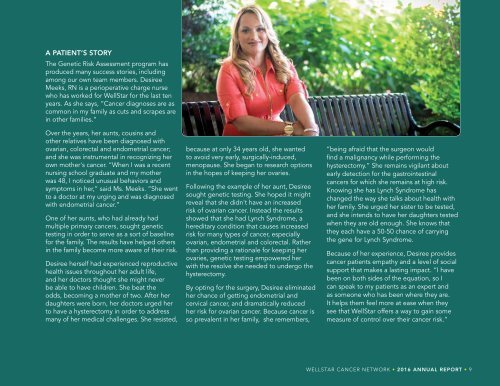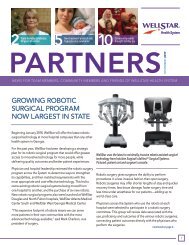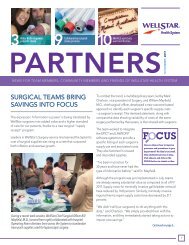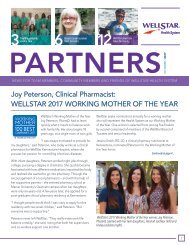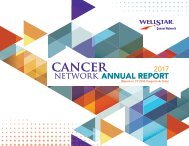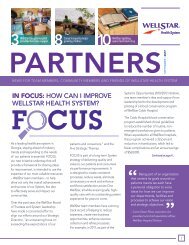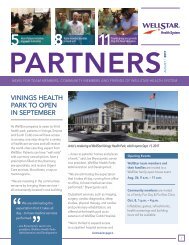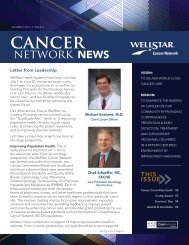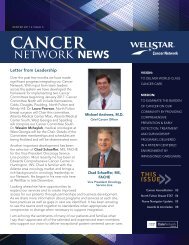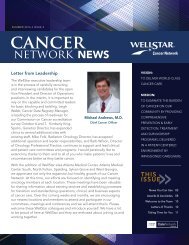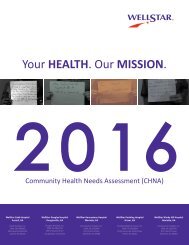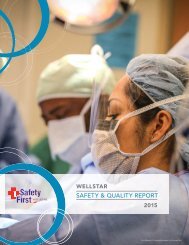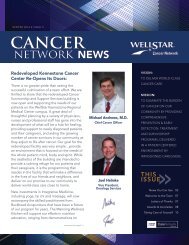WellStar Cancer Network 2016 Annual Report
Create successful ePaper yourself
Turn your PDF publications into a flip-book with our unique Google optimized e-Paper software.
A PATIENT’S STORY<br />
The Genetic Risk Assessment program has<br />
produced many success stories, including<br />
among our own team members. Desiree<br />
Meeks, RN is a perioperative charge nurse<br />
who has worked for <strong>WellStar</strong> for the last ten<br />
years. As she says, “<strong>Cancer</strong> diagnoses are as<br />
common in my family as cuts and scrapes are<br />
in other families.”<br />
Over the years, her aunts, cousins and<br />
other relatives have been diagnosed with<br />
ovarian, colorectal and endometrial cancer;<br />
and she was instrumental in recognizing her<br />
own mother's cancer. “When I was a recent<br />
nursing school graduate and my mother<br />
was 48, I noticed unusual behaviors and<br />
symptoms in her,” said Ms. Meeks. “She went<br />
to a doctor at my urging and was diagnosed<br />
with endometrial cancer.”<br />
One of her aunts, who had already had<br />
multiple primary cancers, sought genetic<br />
testing in order to serve as a sort of baseline<br />
for the family. The results have helped others<br />
in the family become more aware of their risk.<br />
Desiree herself had experienced reproductive<br />
health issues throughout her adult life,<br />
and her doctors thought she might never<br />
be able to have children. She beat the<br />
odds, becoming a mother of two. After her<br />
daughters were born, her doctors urged her<br />
to have a hysterectomy in order to address<br />
many of her medical challenges. She resisted,<br />
because at only 34 years old, she wanted<br />
to avoid very early, surgically-induced,<br />
menopause. She began to research options<br />
in the hopes of keeping her ovaries.<br />
Following the example of her aunt, Desiree<br />
sought genetic testing. She hoped it might<br />
reveal that she didn't have an increased<br />
risk of ovarian cancer. Instead the results<br />
showed that she had Lynch Syndrome, a<br />
hereditary condition that causes increased<br />
risk for many types of cancer, especially<br />
ovarian, endometrial and colorectal. Rather<br />
than providing a rationale for keeping her<br />
ovaries, genetic testing empowered her<br />
with the resolve she needed to undergo the<br />
hysterectomy.<br />
By opting for the surgery, Desiree eliminated<br />
her chance of getting endometrial and<br />
cervical cancer, and dramatically reduced<br />
her risk for ovarian cancer. Because cancer is<br />
so prevalent in her family, she remembers,<br />
“being afraid that the surgeon would<br />
find a malignancy while performing the<br />
hysterectomy.” She remains vigilant about<br />
early detection for the gastrointestinal<br />
cancers for which she remains at high risk.<br />
Knowing she has Lynch Syndrome has<br />
changed the way she talks about health with<br />
her family. She urged her sister to be tested,<br />
and she intends to have her daughters tested<br />
when they are old enough. She knows that<br />
they each have a 50-50 chance of carrying<br />
the gene for Lynch Syndrome.<br />
Because of her experience, Desiree provides<br />
cancer patients empathy and a level of social<br />
support that makes a lasting impact. “I have<br />
been on both sides of the equation, so I<br />
can speak to my patients as an expert and<br />
as someone who has been where they are.<br />
It helps them feel more at ease when they<br />
see that <strong>WellStar</strong> offers a way to gain some<br />
measure of control over their cancer risk.”<br />
WELLSTAR CANCER NETWORK • <strong>2016</strong> ANNUAL REPORT • 9


